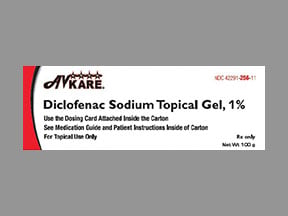
Arthritis Pain Reliever Coupons & Savings Card – Discount Prices from $9.65
Brand for: Acetaminophen er
This drug is used to treat mild to moderate pain (from headaches, menstrual periods, toothaches, backaches, osteoarthritis, or cold/flu aches and pains) and to reduce fever.
Our Arthritis Pain Reliever coupons are free to use. You can print the coupon, email it to yourself, or receive the Arthritis Pain Reliever coupon via text message. To get your free discount, show the pharmacist your Arthritis Pain Reliever savings card which has the discounted coupon price. Use our filters below to edit the prescription box to match your needs. The Arthritis Pain Reliever prices will update based on your prescription needs. Above our Arthritis Pain Reliever coupons, you can change the location to see pharmacy prices in other areas. Our prescription discount card will update online with the specific pharmacy costs associated with your edits. Be sure to text, email, or print the Arthritis Pain Reliever savings card code that you need after editing the prescription box and location field. Show the discount card to your pharmacist before paying.
My prescription
Edit
100GM of 1%, Diclofenac Sodium (1 Tube)
Select pharmacy

Albertsons
$9.65
COUPON PRICE
Walgreens
$10.99
COUPON PRICE
Walmart
$19.56
COUPON PRICEArthritis Pain Reliever savings card
Show this card to your pharmacist
Albertsons
$9.65
BIN
ID
PCN
GRP
019876
LHD3E0229C
CHIPPO
LHX
Powered by
This drug is used to treat mild to moderate pain (from headaches, menstrual periods, toothaches, backaches, osteoarthritis, or cold/flu aches and pains) and to reduce fever.
Our Arthritis Pain Reliever coupons are free to use. You can print the coupon, email it to yourself, or receive the Arthritis Pain Reliever coupon via text message. To get your free discount, show the pharmacist your Arthritis Pain Reliever savings card which has the discounted coupon price. Use our filters below to edit the prescription box to match your needs. The Arthritis Pain Reliever prices will update based on your prescription needs. Above our Arthritis Pain Reliever coupons, you can change the location to see pharmacy prices in other areas. Our prescription discount card will update online with the specific pharmacy costs associated with your edits. Be sure to text, email, or print the Arthritis Pain Reliever savings card code that you need after editing the prescription box and location field. Show the discount card to your pharmacist before paying.
Arthritis Pain Reliever FAQs
Using the SaveHealth discount card, what is the price of Arthritis Pain Reliever without insurance?
Using the SaveHealth discount card, the price of Arthritis Pain Reliever without insurance is $9.65.
What is the price of Arthritis Pain Reliever at Walgreens?
The price of Arthritis Pain Reliever at Walgreens is $10.99.
What is the price of Arthritis Pain Reliever at Walmart?
The price of Arthritis Pain Reliever at Walmart is $19.56.
